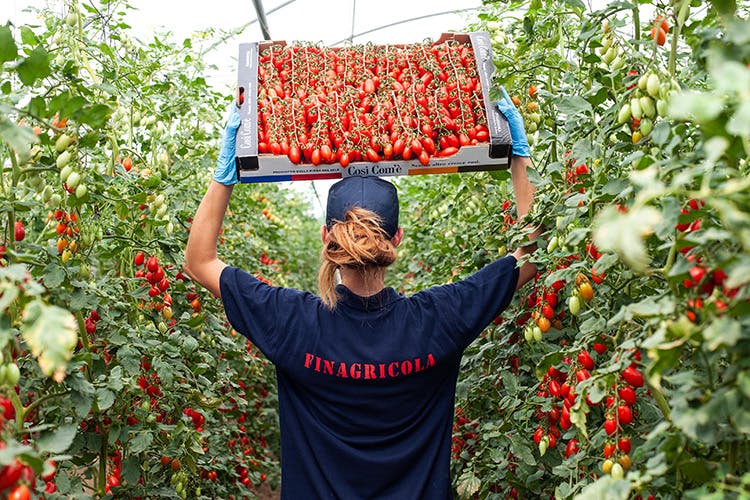
We work with farmers on the frontline of this generation’s most pressing environmental issues. They might be ranchers, cheesemakers, or beekeepers, but they’re also entrepreneurs, experts, and innovators. For them, Earth Day isn’t just a moment on the calendar; it’s 365 days a year.
Eataly Magazine spoke with some of our small producers about their history and heritage, their enthusiasm for their work, and thoughts on the future of the food industry. From olive oil millers who pour passion into each bottle, to farmers honoring the humble heirloom tomato, explore our interview series to learn more from the experts, and celebrate their work.

Interview with Così Com'e on Preserving Heirloom Tomatoes, from Seed to Label
For more than 25 years, Fianagricola – a small 24-farm cooperative in the fertile Piana del Sale of Campania – has been dedicated to carefully cultivating local produce varieties. The cooperative was founded with one mission: to guarantee a pure, traceable Italian product, from seed to label.
Upon this fertile land in the south of Italy, Così Com’è is born. Meaning “as they are”, Così Com’è tomatoes are carefully sowed, pollinated by bees, hand-harvested at their peak, and jarred within only a few hours, resulting in pure tomato preserves that taste off-the-vine fresh. In fact, our chefs in Italy spent months testing out more than 40 different types of tomato products from our shelves in order to create the perfect spaghetto al pomodoro recipe – and Così Com’è was the chosen one. "It requires care, patience, respect, competence and love to achieve a premium product," Elisa Vecchi of Così Com’è tells Eataly Magazine. "Working with food offers a unique possibility to connect with the land, with the tradition of a territory, and with its identity."

Interview with Roi on Pouring Passion and Curiosity into Olive Oil Production
For five generations, the Boeri family – historically nicknamed “Roi” – has devoted itself to sharing the flavors of the Ligurian coast through the production of olive oil, pesto, and beyond. The family’s story began in 1890, when Giuseppe Boeri first rented a communal olive oil mill in the hills of Liguria to process local Taggiasca olives using a traditional stone press. These early activities became the roots of what would become a long and beautiful family journey that continues to this day with Paolo who, alongside his father, dedicates his time and passion to the family oil mill.
Grown on narrow terraces about 1,150 feet above sea level in the Valle Argentina – just inland of Sanremo on the Ligurian Sea – the olive trees enjoy a mild climate surrounded by Mediterranean shrubs, chestnut trees, and wild herbs. It's a steep and difficult terrain, where everything is still cultivated and hand-harvested by the team at Roi, who carefully tend to the entire process, pouring passion and curiosity into each activity. "I chose to do this job out of passion and I continue like this every day," Paolo Boeri Roi tells Eataly Magazine. "I think the food industry is the best market to work in, if not the best – certainly the most enjoyable. Having the opportunity to travel, meet people and taste dishes and products every day of your life makes it beautiful, full and always interesting."

Interview with Wulf's on Nurturing Connections, from Water to Plate
Hailing from Massachusetts, Wulf's works with artisanal fishermen and farmers who share its passion for premium, traceable seafood and are devoted to sustainability and the health of the oceans. The team at Wulf's cultivates trusted relationships with fishermen, divers, and experts across the globe who are as obsessed with quality and transparency as it is. The legacy and passion of founder Sam Wulf continues to this day, two generations later – from the way they source their fish, to how they cut and deliver it. "We still cut our fish by hand – not machines," Alisha Lumea of Wulf's tells Eataly Magazine, "because nothing matches the care and quality of old school skills."
Passion, quality and an uncompromising eye for quality are at the core of Wulf's world, recognizing that good food "touches every aspect of our lives: the environment, culture, health, pleasure,' Lumea continues. "Food helps us connect with our fellow humans. It helps us understand and nurture each other. What could be more relevant and exciting than that?"